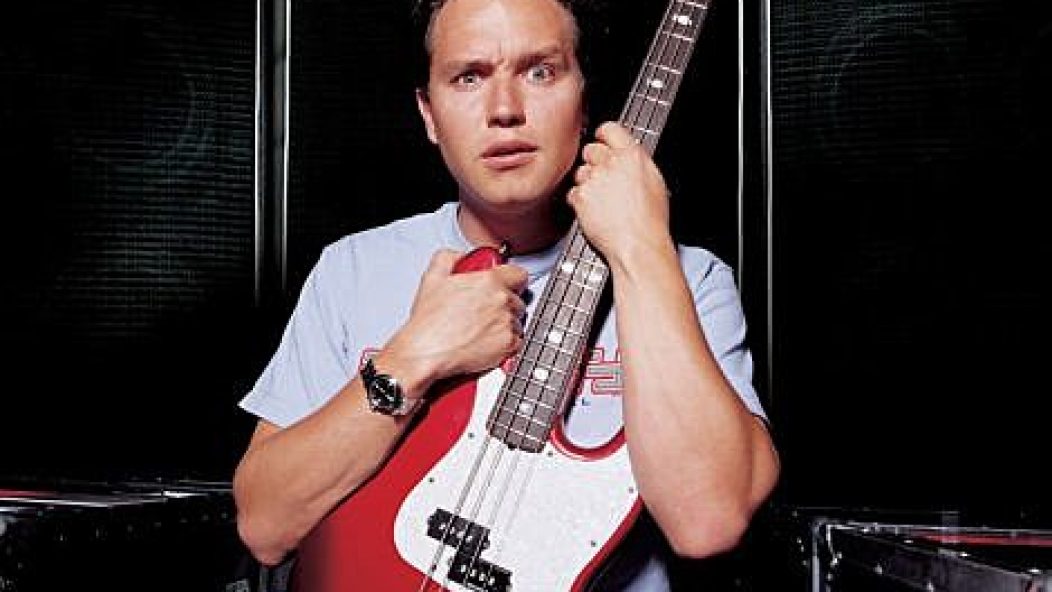
Motion City Soundtrack: Producer Mark Hoppus on the making of My Dinosaur Life
Although Motion City Soundtrack tossed around several big names in consideration for production duties on their major-label debut, they settled on Blink-182’s frontman Mark Hoppus, who also produced the band’s 2005 sophomore release Commit This To Memory. “I was always fond of the idea of going back to him because I’m a fan of working with someone that really likes us,” says guitarist Josh Cain. “Mark likes the music; he likes the direction we’re going; and he has ideas to throw back at us.” AP caught up with Hoppus to find out if the feeling is mutual.
Why did you decide to work with MCS again?
MARK HOPPUS: Working with them the first time was a lot of fun and a great experience. I’ve always been a fan of the band and their music, so when they sent me the demos for the new album and asked me to produce it, it was a no-brainer.
How was this experience different from when you produced Commit This To Memory?
The experiences between the first album I recorded with MCS and this one were very similar. The guys know 80 to 90 percent exactly what they do and do not want–and Josh and Justin [Pierre, vocals/guitar] battle for who can come up with the most guitar parts to fit into one song. On this album, Justin was much more confident in his voice, and he wanted to explore a bunch of different ways to express his lyrics. They’ve just recently released “Her Words Destroyed My Planet,” and a lot of the comments I’ve seen [online] say, “I didn't even recognize Justin’s voice when the song started.” That’s exactly what he wanted. Oh, and there was about 80 percent less Josh pacing outside, animatedly talking to managers on his cell phone during [the making of] this album.
Were you at all apprehensive about having to work around Tony Thaxton’s arm situation?
Somehow, no. In retrospect, maybe I should have been more nervous about the prospect of Tony’s arm, but I always felt like it was inevitable that he would get better and play his parts. Maybe that comes from being in bands with Travis [Barker], who plays on through broken arms, feet, surgeries, etc., or the fact that we recorded much of the (+44) record in the same manner, where the drums come last. I think that in a way, it’s exciting for drummers to play to the songs in their near-complete form, because rather than having everything else build off of the drums, they get to play to the band with the guitar leads and vocals done. In this way, the drummer can tailor his drum fills and parts to the phrasing of everything else going on. In any case, Tony came through in the end and played like he’d never missed a beat. Pun intended.
What do you think makes MCS stand out from so many other pop-oriented acts out there today?
I think their music is honest, their lyrics are honest and they write from the heart–people connect with that. When bands are forcing something or playing to what they think other people expect from them, the listener can see through it. These guys are the real deal; they write great songs, and I think people really connect with Justin’s lyrics.
Was there any additional pressure recording this album knowing that My Dinosaur Life was MCS’ major-label debut?
I didn’t feel pressure any more so than on any other record. Every album a band records has to be their best one. There’s always pressure to do better, go further, improve and evolve. No band worth their salt goes into the studio with the attitude that “This album doesn’t really count, we’re just going to do what we did last time and see what happens.”
How involved were you in the songwriting process?
Motion City are filled with talented musicians and songwriters. With them, I work more on arrangement, dynamics, transitions, lyrical phrasing and these types of things. The only “problem” with MCS is sometimes they have too many awesome ideas and trying to figure out where each part makes the most sense and [where it can] fit into the song. They are open and receptive to ideas, but have a strong sense of who they are and what they want. As such, they stand up for what they think; in that dynamic I think is where the greatness of this band shows through. I’ll work with them any time they ask. —Jonah Bayer








